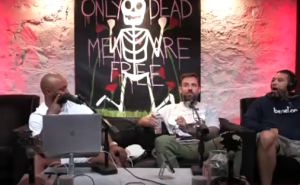In a recent interview with No Jumper host Adam22, the heated discussion focused on the exploitation of black trauma for monetary gain. The conversation centered around Adam22’s interviews with rappers involved in street culture, especially those who have experienced violence and loss. Critics argue that by interviewing these young artists and discussing their conflicts, Adam22 capitalizes on the struggles of these communities, profiting from the deaths and trauma that impact young black men. The dialogue highlighted broader concerns about media platforms that monetize content derived from sensitive topics, questioning the ethical implications of such journalism.

The Catalyst: Controversial Interview Titles
In the interview, Adam22 is called out for the provocative and sometimes insensitive titles of his YouTube videos. One example discussed is an interview with rapper FBG Cash, who shared controversial stories, including one about a supposed photo at King Von’s mural, as well as his feuds with other rappers like Lil Durk. For Adam22, these titles seem to be part of standard journalistic practice—capturing the interest of viewers by addressing topics that the artists bring up in their music. He asserts that discussing these feuds is logical because they are integral to the rappers’ content.
However, critics argue that the sensationalism of these titles goes beyond merely reporting the news. Instead, they claim it sensationalizes violence and conflict, which is a disservice to the audience and disrespects the people involved. By focusing on these issues in such a provocative way, critics say Adam22 ignores the personal toll on the communities affected by gang violence.
The Debate Over Responsibility
Throughout the conversation, Adam22 maintains that his interviews benefit the artists by giving them a platform to discuss their music and reach a larger audience. He claims that his platform has helped numerous artists expand their fan bases and promote their work. He also notes that his questions are driven by genuine interest in the artists and their lives, as he personally enjoys drill music and wants to discuss the themes found in the songs.
Conversely, his interviewers argue that his actions contribute to a negative cycle. They assert that Adam22’s platform makes it acceptable to use the trauma and conflicts of young black men as a form of entertainment for a primarily non-black audience, further dehumanizing them. They criticize him for failing to address the reality of the violence and loss these individuals experience and instead treating it as mere content for clicks and views. According to his critics, this practice demonstrates a lack of responsibility and empathy toward the very communities from which he profits.
Profit Versus Awareness: The Ethical Dilemma
Adam22 addresses the issue of monetization, admitting that his interviews are indeed monetized by default because they are on YouTube. He points out that he’s simply producing the content that his audience demands and that the high view counts indicate public interest. In his view, his platform offers artists exposure and an opportunity to talk about what matters to them. Additionally, Adam22 notes that he often asks artists about their music, which includes themes of violence and struggle that they’ve chosen to address in their work. Therefore, he feels it’s not exploitative but rather a fair representation of the artists’ stories.
In contrast, the criticism underscores a broader ethical issue. Adam22 is asked to reflect on whether his platform could focus on different, less harmful aspects of these artists’ lives, promoting their music without delving into potentially harmful topics. His interviewers propose that the real measure of ethical journalism should consider not only what the audience wants but also the impact on the people being interviewed. They argue that some stories should be told with more sensitivity, especially when dealing with young men who may not fully understand the consequences of their words on camera.
The Cost of Content Creation
Adam22’s approach to content creation raises questions about media ethics, particularly regarding the boundaries between journalism and sensationalism. As media platforms continue to evolve, so does the way audiences consume stories about real-life violence and trauma. By highlighting conflicts within rap culture, Adam22’s platform blurs the line between storytelling and exploitation, leading to debates over the role of journalists and content creators in shaping public perceptions.
Critics contend that his style of content contributes to an atmosphere that glamorizes street violence rather than promoting positive narratives or solutions. They argue that the focus should be on understanding the systemic issues that lead young black men to lives fraught with danger and that interviewers like Adam22 should aim to bring awareness to these issues rather than treating them as spectacle. From this perspective, platforms like No Jumper should strive to be a part of the solution, encouraging growth and empowerment rather than perpetuating cycles of trauma.
Reflecting on the Role of Media in Social Issues
The dialogue between Adam22 and his critics underscores a vital issue: the role of media in covering socially sensitive topics. While media has the power to highlight issues and bring them to public attention, it also holds the responsibility to portray them with accuracy and empathy. In Adam22’s case, the criticism reflects a need for content creators to consider the ethical ramifications of their work, especially when dealing with vulnerable communities.
As audiences continue to consume media at an unprecedented rate, creators face the challenge of balancing popularity with ethics. Adam22’s situation serves as a reminder that the drive for clicks and views can often clash with the responsibility to promote understanding and empathy. By reevaluating the purpose and impact of such content, media creators can play a positive role in raising awareness while respecting the dignity of those whose stories they share.














